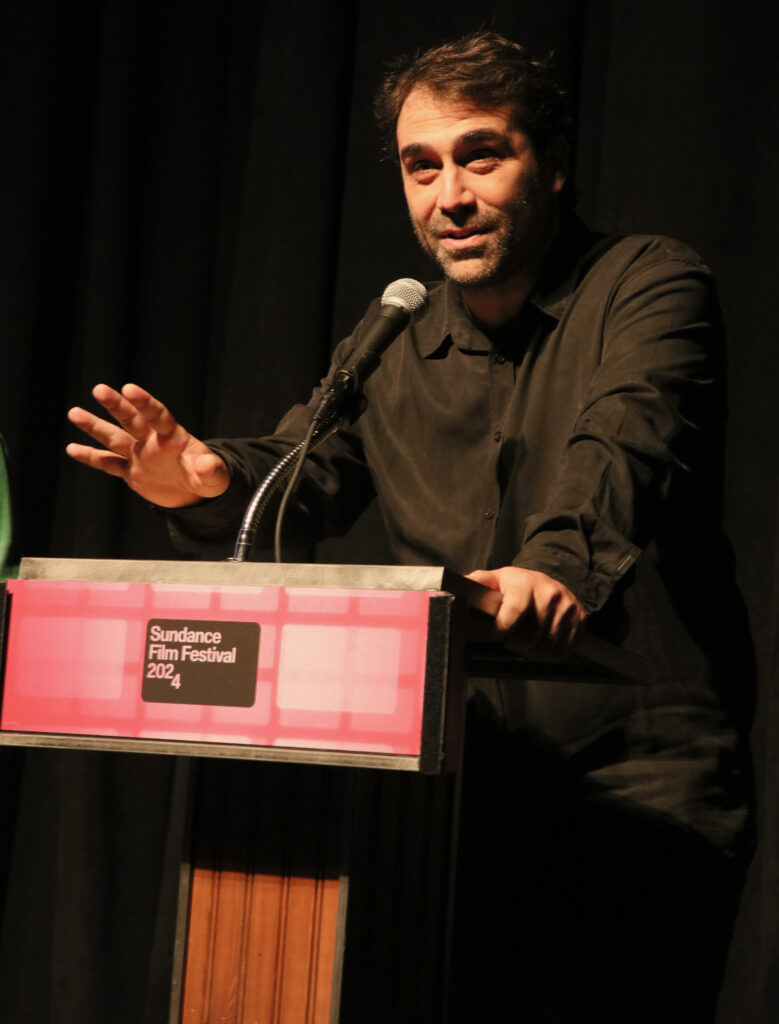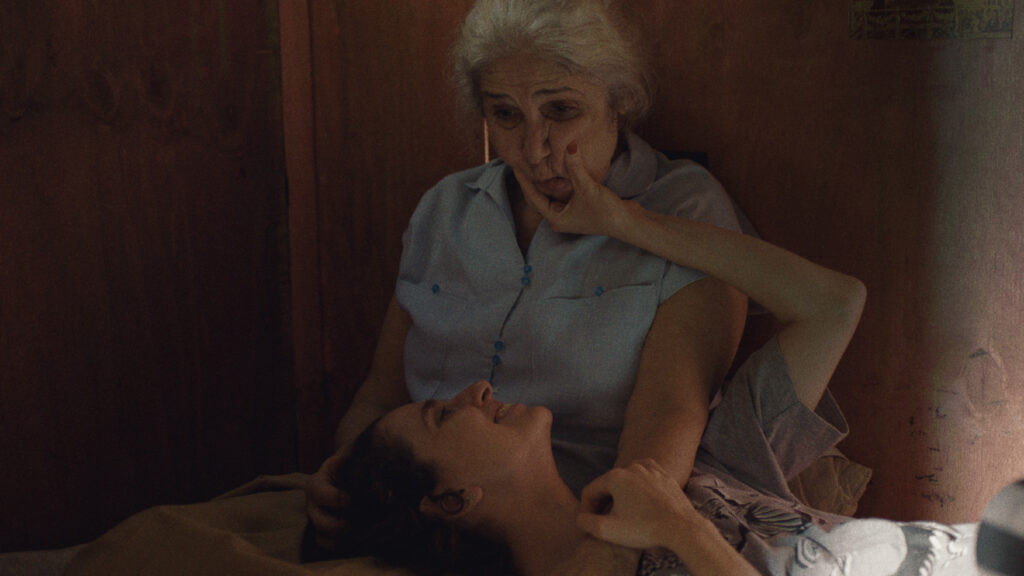By Lucy Spicer
One of the most exciting things about the Sundance Film Festival is having a front-row seat for the bright future of independent filmmaking. While we can learn a lot about the filmmakers from the 2024 Sundance Film Festival through the art that these storytellers share with us, there’s always more we can learn about them as people. This year, we decided to get to the bottom of those artistic wells with our ongoing series: Give Me the Backstory!
A filmmaker is bound to feel self-imposed pressure when it comes to their feature debut. In Pedro Freire’s case, that pressure was compounded by his choice of subject: his late mother, Brazilian actor Malu Rocha. Written and directed by Freire, Malu follows its title character as she contends with middle age, tense relationships with her adult daughter and conservative mother, and the fact that her glory days are behind her.
“As it is a very personal film, I cried a lot during the process, from the first versions of the script to editing. I think I only stopped crying during the color correction,” admits Freire. “During filming, in the most dramatic scenes, I would go up to the actresses to talk to them between takes, and I would be bathed in tears.” But sharing the stakes proved to be the best direction he could give. “The subject was deeply emotional for me, and it became that way for them, too.”
Malu premiered at the 2024 Sundance Film Festival as part of the World Cinema Dramatic Competition. And though Freire’s feature directorial debut involved a lot of crying, he insists that the act of filmmaking is a joyful one — and powerful. “I have a lot of fun directing films, directing actors, thinking about camera positioning, editing. And I believe that we all have to seek in life to work with something that gives us joy and the desire to continue living,” he explains. “At the same time, cinema is an extremely powerful means of transmitting ideas and emotions. So there is a huge responsibility in making a film — making a film is always a political act. So I try to find a path in cinema where I can have fun and make a difference in the world at the same time.”
Read on to learn more about Malu and its director, including Freire’s favorite part of the filmmaking process and why he believes this story needs to be told now.
What was the biggest inspiration behind Malu?
Malu is based on the story of my own mother, Malu Rocha (1947–2013), an actress herself. And her influence on my artistic career is gigantic. The first “serious” film I watched, at the age of six, was Kurosawa’s Seven Samurai, which my mother got a dubbed copy of so I could watch. Throughout my childhood and adolescence, she always nourished me with books and films. However, we had a very difficult relationship, and at the end of her life she went through particularly difficult moments. These moments are portrayed in the film, a family drama.
In terms of cinema, my biggest influence on this film is John Cassavetes. I’ve been in love with his cinema since I was 18, when I watched Faces for the first time in a street movie theater in Rio de Janeiro. At that moment, I understood that my path would be to direct films with strong work on the script and with the actors. Many years later, Malu, my first feature film as a director, was rehearsed using some of Cassavetes’ techniques.

Filmmaker Pedro Freire addresses the audience at the January 21 premiere of “Malu” at Prospector Square Theatre in Park City. (Photo by Robin Marshall/Shutterstock for Sundance Film Festival)
Why does this story need to be told now?
I believe that we live in a particular moment in the history of humanity, in which ideological polarization has reached dangerous extremes, both for democracy and, ultimately, for the very survival of the human species. Malu talks about the attempt to live with these ideological differences, at the same time that it has a protagonist who is a survivor of an authoritarian past in my country, a situation that could happen again in Brazil or anywhere else in the world. We need to fight for democracy, now more than ever.
Tell us an anecdote about casting or working with your actors.
For five years I worked on the film’s script with an actress in mind for the protagonist. She had always been linked to the project, since the first synopsis. Literally two months before we started filming, she became deeply ill, and we had to change the lead actress in the film — just a month before we started rehearsals. During all this time, I always had in my head that Yara de Novaes, one of the greatest actresses in our theater, could play the role very well, and at that moment I got in touch with her and luckily she could and wanted to play the role. Today, with the film ready, I can say that the exchange couldn’t be better.
Your favorite part of making the film? Memories from the process?
My favorite part of making the film was the rehearsals. After the first week of rehearsals, I became desperate: I felt like nothing was working, I rewatched the recorded scenes and almost cried, I even told my wife that the film would be a disaster. The actresses were working on stereotypes of their characters: Yara had understood that Malu should be heavy and depressed, Juliana was playing a classic malevolent old lady, Carol was flat on her character, Átila was overacting a lot. I took courage and opened up to them, saying, “This is really bad; we have to start all over again.” Luckily they were very, very generous and courageous. We started from scratch and the end result is on the screen. I’m very proud of them.
We rehearsed for three weeks; each scene in the script was improvised a few times. We worked in rehearsals with improvisations on the script, without at any point memorizing the lines — we left them to be memorized during filming. I believe that the cast had a fantastic commitment during these rehearsals and filming, and they are the strongest point of the film.

Films are lasting artistic legacies, what do you want yours to say?
I would like my film to leave behind the idea — apparently simple but deeply revolutionary — that the most important thing in life is empathy, the ability to identify with others. Malu desperately tries to relate to her mother and daughter, but she doesn’t always succeed. What matters is trying.
Tell us why and how you got into filmmaking.
I come from a family of stage actors, and my first childhood memories are traveling around Brazil with my parents, who performed their plays from city to city across the countryside. When I was a teenager, my father became a film and TV actor, and I was able to watch several film sets. My family of actors — my father, mother, and three siblings are actors — led me to understand, from a very early age, that I wanted to write for actors, direct actors, live among actors. I thought this would only be possible in theater, I thought cinema was an environment in which the actors were just a small part of a gigantic machinery. But I loved cinema above all other arts. When I saw Cassavetes for the first time in 1999, I understood that a real and deep work with actors was not only possible in theater, but also in cinema.
What was the last book you read?
Frantz Fanon’s The Wretched of the Earth. I am currently very moved by the subject of decolonization.
One thing people don’t know about me is _____
I am very, VERY afraid of spiders.
Early bird or night owl?
Night owl, for sure. But after my daughter was born, I was forced to become an early bird!
Who was the first person you told when you learned you got into the Sundance Film Festival?
My sister, Isadora. She is part of the story. The character of Joana is based on her and me.
What’s your favorite film that has come from the Sundance Institute or Festival?
Hedwig and the Angry Inch